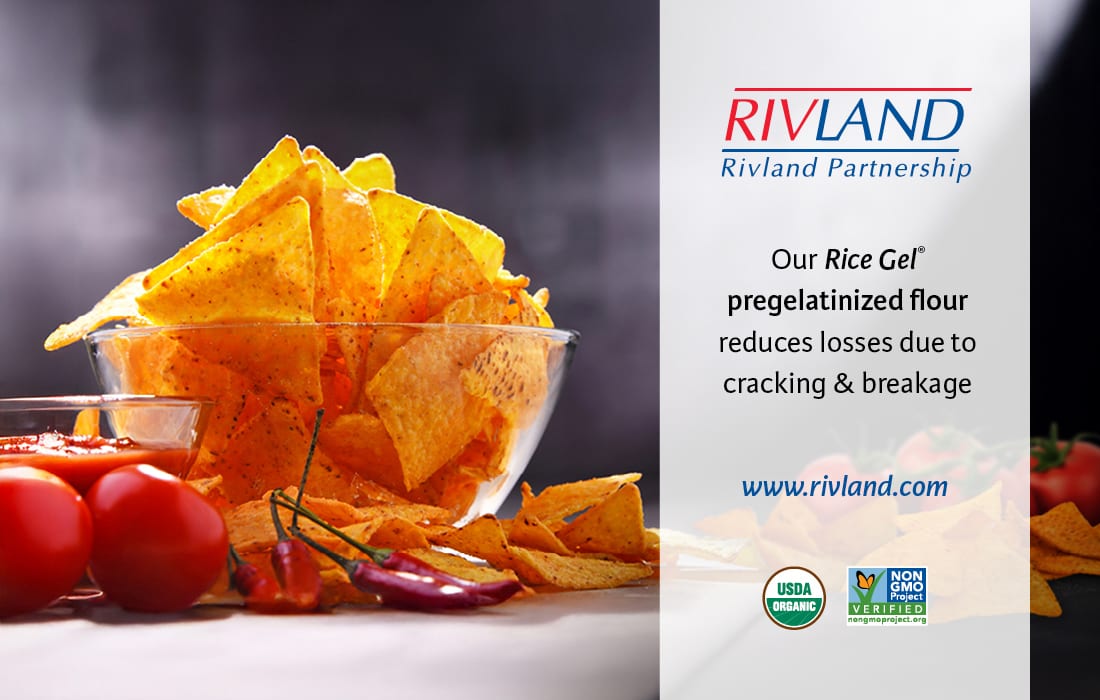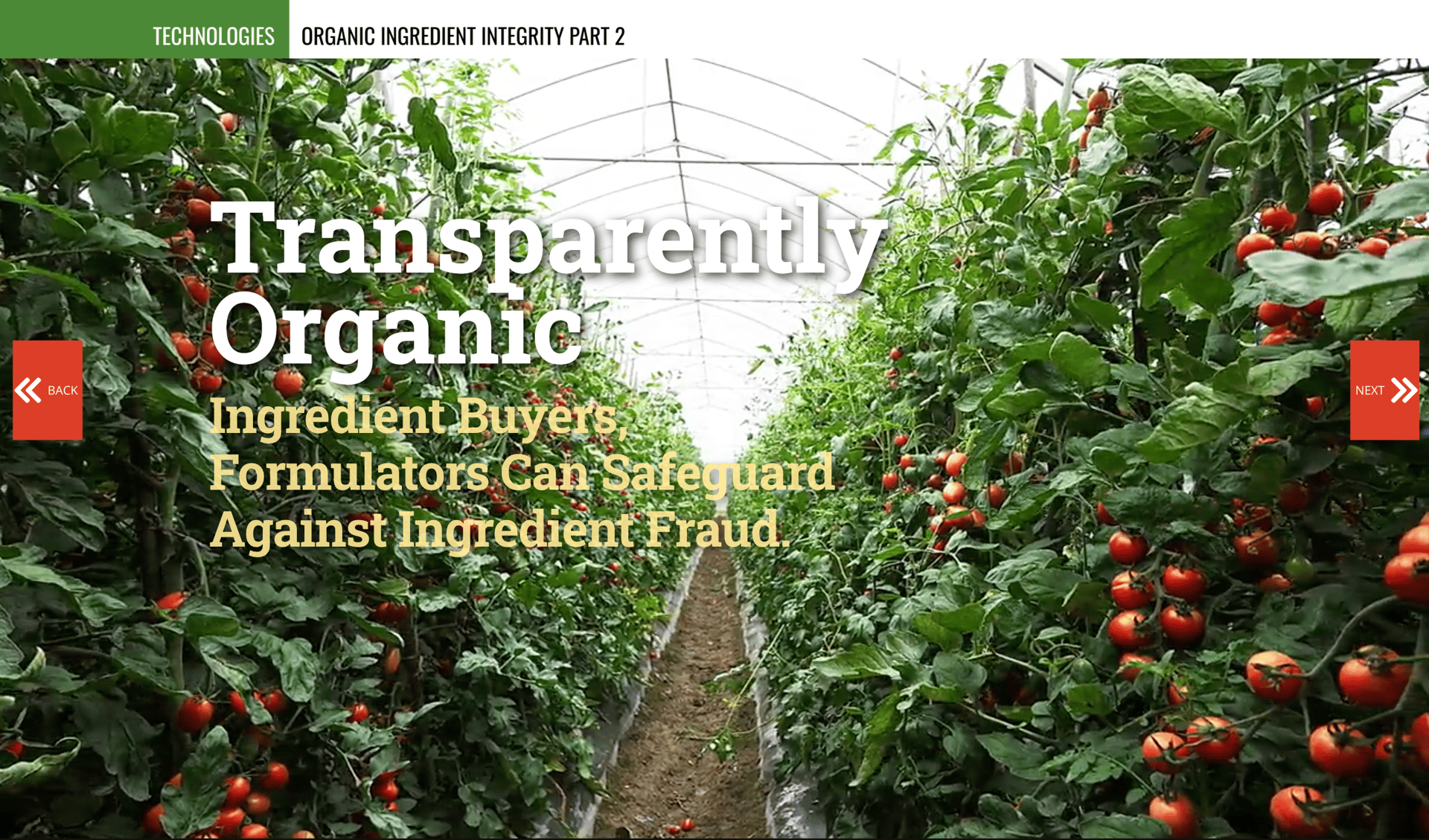ORGANIC INGREDIENT INTEGRITY part 1
Technologies
Ingredient buyers, formulators can safeguard against ingredient fraud.
Transparently Organic
By Erin Costello
by Kerry Hughes, MS, Contributing Technical Editor
Organic food sales reached US$65.4 billion last year, according to the Organic Trade Assn.’s 2025 “Organic Market Report.” But some of it might not really have been organic. Video credit: loveguli / Getty Images Plus
In spite of increased oversight, such as the USDA’s Strengthening Organic Enforcement (SOE) rule implemented last year, occurrences of fraud in regard to organic sourcing remain a multibillion-dollar problem. The demand for organic food and beverage products continues to grow, driven by consumer preferences for health-conscious and environmentally friendly choices. However, as the organic market expands, so does the risk of fraud.
Organic fraud occurs when non-organic products are falsely marketed as organic. This can happen at multiple points in the supply chain, from farm-level misrepresentation to fraudulent documentation in global trade. Food and beverage manufacturers must be vigilant in their sourcing strategies to ensure authenticity, maintain consumer trust, and comply with stringent regulatory requirements.

Bob's Red Mill, one of the first mills to build its own testing lab, exemplifies how far dedicated companies will go to ensure trustworthy organic compliance. Credit: Bob's Red Mill Co.
According to Kathryn Britton, Executive Vice President of the watchdog group Where Food Comes From, common fraudulent practices in organics include:
• Blending organic with non-organic ingredients – Mixing organic and conventional ingredients to increase volume while fraudulently maintaining an organic label.
• Misrepresentation of country of origin or international equivalency– Sourcing non-organic ingredients from regions with weak enforcement and mislabeling their origin.
• Lack of traceability – Inadequate supply-chain transparency that allows fraudulent ingredients to enter legitimate markets.
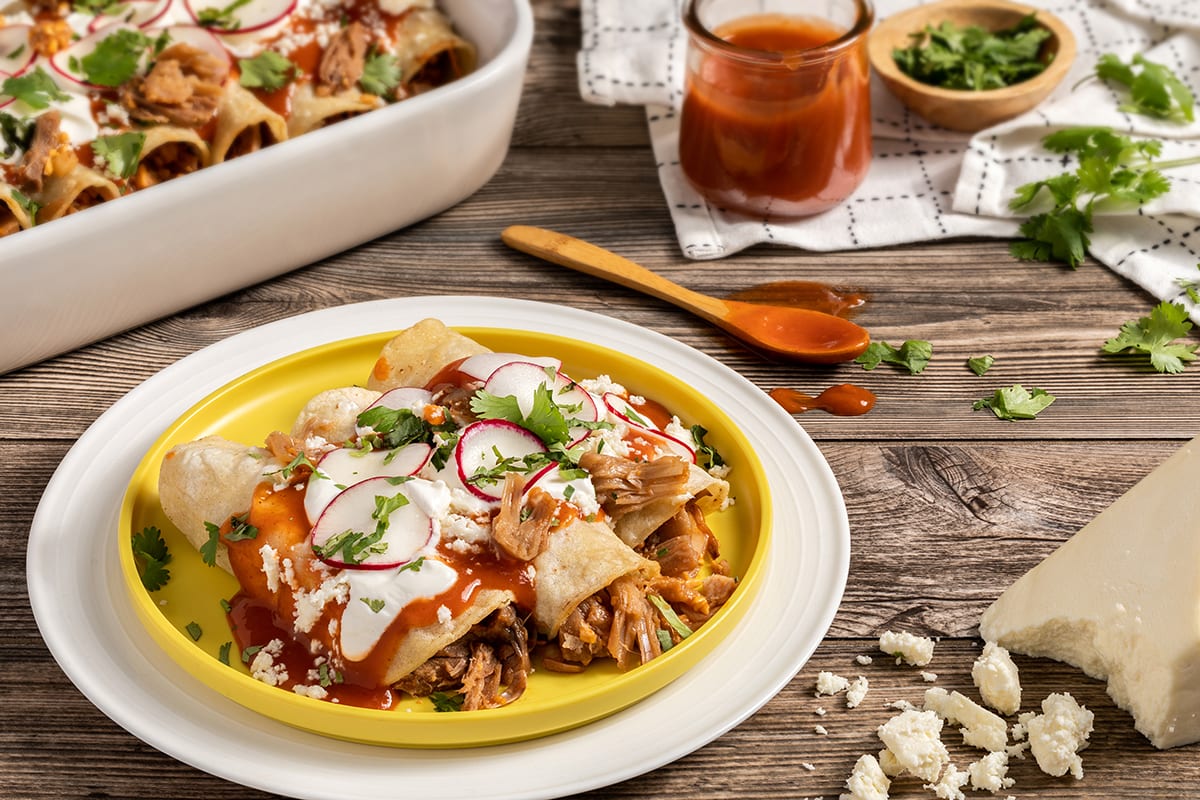
When the supply chain for organic ingredients stretches across continents, extra diligence is required across every link in the supply chain to guard against fraud. Courtesy of: The Jackfruit Co.
Fraud vs. Adulteration
While organic fraud involves the misrepresentation of non-organic goods as organic, food adulteration is a broader issue that encompasses any intentional addition of inferior or harmful substances to food products. Food adulteration can include adding synthetic chemicals, artificial colors, or low-cost fillers or alternatives to increase profit margins at the expense of safety and quality.
Unlike organic fraud, which primarily deceives consumers seeking organic integrity, food adulteration can pose significant health risks and often violates food safety regulations. Both issues require rigorous oversight, but organic fraud demands additional scrutiny within the certification and labeling processes. With strict organic certification and oversight, such adulteration is much more likely to be avoided.
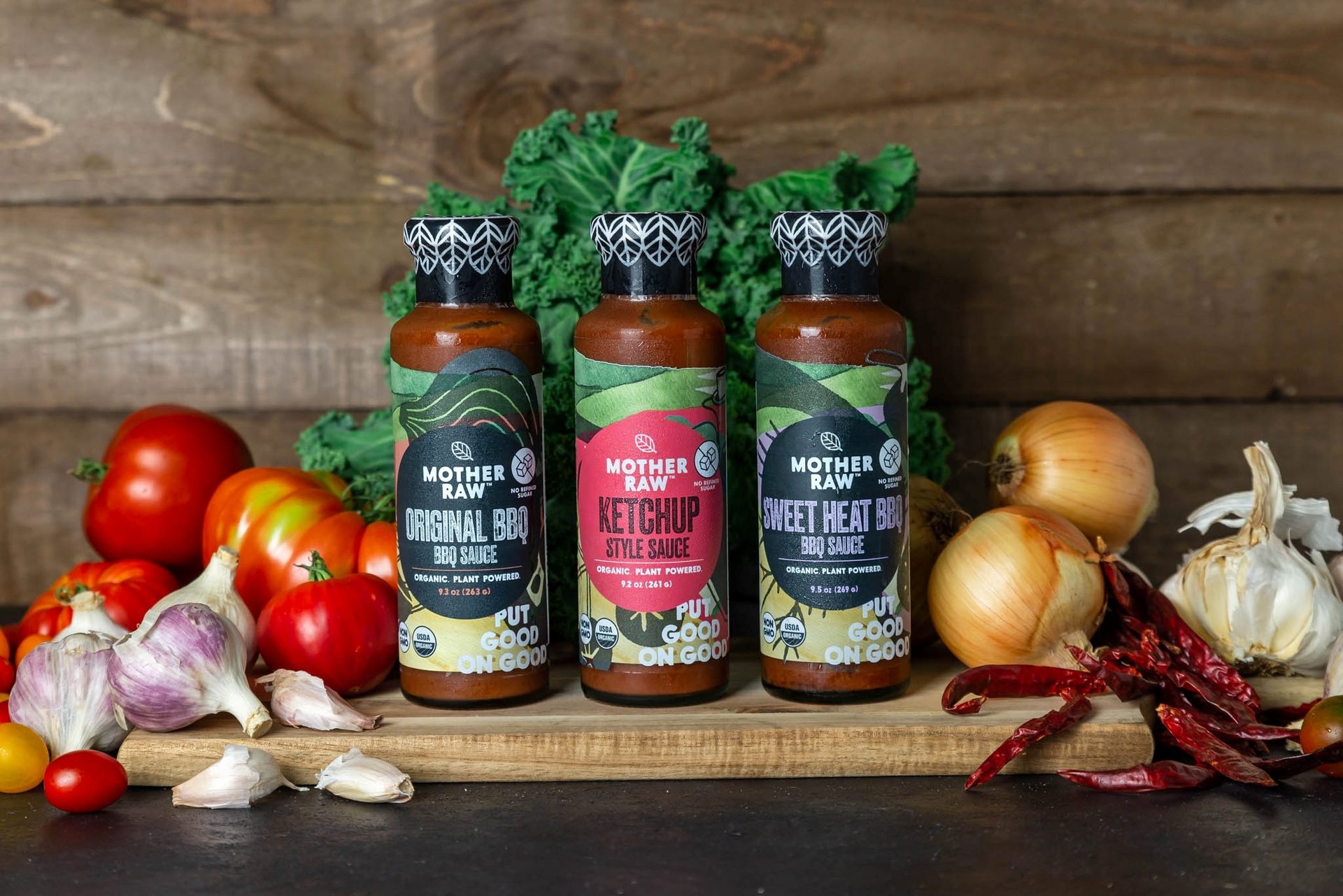
To ensure complete transparency, companies known as organic product makers will clarify if any one ingredient is not fully organic by listing the percentage of organic ingredients. Courtesy of: 80 Acres Urban Agriculture, Inc.
ABCs of Organic Botanicals
In the herbal trade—whether herbs for foods, dietary supplements, or other markets—there are special issues relating to herbal quality and raw materials of which buyers need to be aware. For this reason, the American Botanical Council (ABC), in partnership with the American Herbal Pharmacopoeia (AHP) and the University of Mississippi’s National Center for Natural Products Research (NCNPR), developed the Botanical Adulterants Prevention Program (BAPP).
As described by the ABC, the BAPP is “the largest international nonprofit consortium focused on reducing adulteration in botanical ingredients used in dietary (food) supplements, conventional foods, cosmetics, and other natural health products.” The consortium’s “Best Practices SOP” is designed to “empower suppliers, buyers, and analytical laboratories to ensure the removal of irreparably adulterated and possibly dangerous products (that buyer and supplier agree cannot be lawfully remediated) from global commerce within a contractual framework.”
This framework was “vetted by industry stakeholders through two rounds of public input and carefully designed to be flexible.” The description of the BAPP system also notes that its “contract language and SOP templates include simple but robust GMP-consistent dispute resolution provisions that fairly protect the confidentiality and interests of all parties.”
In the recent past, with the disruptions and burdens to global supply chains, opportunities for fraud in all markets have increased. Another current burden to the system that increases the risk of economic and organic adulteration is the redefining and restructuring of trade agreements and tariff structures. In some cases, this will lead to prices rising, and even when temporary, such cost increases have historically resulted in increased adulteration.
“Shortcuts in the food industry are common, regardless of whether sourcing internationally or domestically,” notes Annie Ryu, CEO and founder of The Jackfruit Co., makers of Jack & Annie’s organic plant-based products. “With organic or any other certification, it’s important to have checks in place to know you’re getting what you think you’re getting. With our pioneering a leading global supply chain for jackfruit, over the past 10-plus years we learned a long time ago to ‘inspect what we expect’.”

Suppliers are meeting the challenge of making access to organic versions of unique ingredients, such as konjac, much easier. Courtesy of: It’s Skinny, Inc.
Steps to Ensure Authentic Organic Sourcing
Buyers for organic ingredients can implement specific steps and considerations in their buying process to ensure authenticity.
• Work with Certified and Reputable Suppliers
Always source from suppliers that have verifiable organic certifications issued by accredited agencies such as the USDA, EU Organic, or JAS (Japanese Agricultural Standard). Perform background checks to validate their credibility and history in organic trade.
• Verify Certification and Documentation
Request and cross-check organic certificates, transaction records, and audit reports. Utilize certification databases like the USDA Organic Integrity Database to confirm supplier claims.
• Conduct Regular Supplier Audits/Visits
Perform on-site and third-party audits to inspect farming practices, processing facilities, and adherence to organic standards. Ensure suppliers maintain proper segregation of organic and conventional goods. Although it is the job of the organic certification body to carry out these audits, the importance of developing long-term relationships and physically visiting suppliers cannot be overemphasized.
• Implement Robust Traceability Systems
Adopt digital traceability tools such as blockchain or enterprise resource planning (ERP) systems to track the journey of all ingredients, including organic or other attributes, from farm to final product. Transparency & traceability are key to preventing fraud.
• Supplemental Testing for Contaminants and Residues
Although the organic accrediting agency provides the services of laboratory testing for pesticide residues and other non-organic contaminants, when there are doubts about food safety or supply chain integrity, manufacturers may wish to conduct additional testing of raw materials to help maintain supply chain integrity.
• Engage in Industry Collaboration
Join industry associations and fraud-prevention initiatives like the Organic Trade Association’s (OTA) Fraud Prevention Program. Sharing knowledge and best practices with other manufacturers can help mitigate risks.
• Educate Your Procurement and Quality Control Teams
Train employees to recognize red flags in documentation, conduct supplier due diligence, and maintain organic compliance. A well-informed team is the first line of defense against fraud.
Preventive Measures
Ryu’s method for preventing organic food fraud when sourcing organic ingredients is to start at the source. “We work with thousands of small farmers, where the average farm is fewer than five acres,” she explains. “It’s always been important to our supply chain—in terms of ensuring the right quality, volume, and price—to have local staff on-site where we’re sourcing our jackfruit.”
However, it should also be emphasized that buying certified organic, fair trade and/or regeneratively grown products makes any food much less likely to be adulterated, as certification requires proof of chain of custody (transparency and traceability), while being checked by a third-party certification body. In comparison, regular food-buying processes often lack full transparency and traceability.
“We view fraudulent practices within the organic supply chain as a serious threat, directly impacting consumer trust and our brand's integrity,” states Rahul Shrikant, Vice President of International Operations for Global Village Fruit, Inc., a builder of international supply chains for fruits that works with The Jackfruit Co. “Recent global supply chain volatility and high food inflation have magnified these concerns, increasing the inherent risks to quality assurance, particularly for organic products. This environment necessitates an even more vigilant approach to safeguarding our supply chain.”
Global Village works hard to prevent organic food fraud for companies sourcing organic ingredients. “Our defense against organic food fraud is built on a proactive and multilayered approach,” explains Shrikant. “This includes rigorous supplier evaluation, frequent and in-depth audits—both internal and through trusted third parties—and a commitment to working closely with farmers and processors who demonstrably adhere to stringent organic standards.”
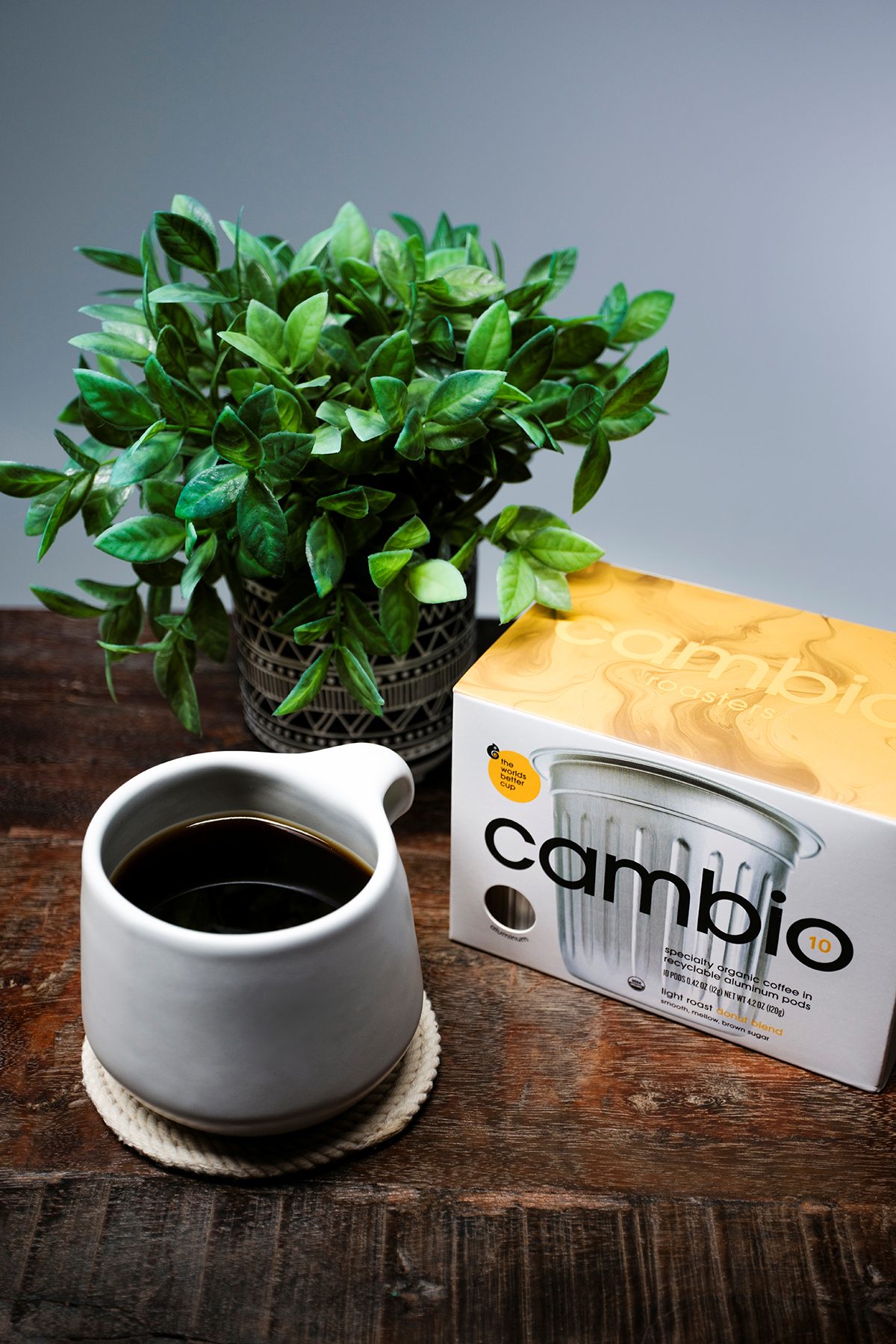
Coffee is one of the beverages most often demanded as organic, with the same consumers seeking sustainable and fair-trade certifications for it as well. Courtesy of: Cambio Roasters, LLC/ChrismanStudios
Kerry Hughes, MS, principal for EthnoPharm, is an ethnobotanist, herbalist, and author with a 20-year record of success in global natural product development and education, innovative product formulation, and nexus-of-market opportunity identification. With a focus on ethnobotanical discovery and strategic innovation, Hughes and EthnoPharm continue to expand the boundaries of new natural product development, catalyze applied phyto-product breakthroughs, and bring to market new, efficacious, and profitable products that not only heal people but help protect the threatened global biodiversity.
